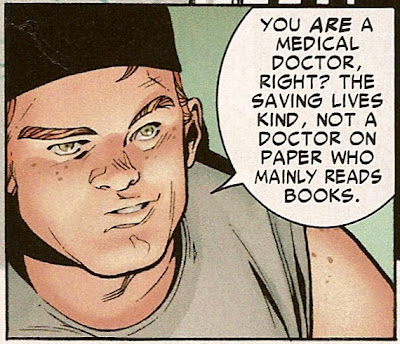
One of the most useful tools for anyone using slides on a computer screen is a good wireless remote. They free you from a lectern, allowing for a much more dynamic and mobile talk.
I recently was given a gift of a new wireless remote (pictured). I don't want to turn this into a review / ad for this
particular product, but I'm very happy with this one so far, and it gives me a good opportunity to talk about some of the different kinds of wireless remotes for slideware.
I've used a few different remotes, and they vary dramatically in their shape and feel. Some are wide, some are round, some are slender. Finding one with the right "feel" is probably a very personal thing. You should probably look to see if you can borrow some and test a few before buying. (Unfortunately, most remotes get stuck in those impossible to open packages, so you can't handle them.)

Similarly, another thing that you often can't see in the packages are how big the receiver that plugs into the USB port is. Again, these differ a lot from one to the other. My old one (top right), from a Targus presenter, was quite wide and chunky, which typically meant that I needed a hub or a short extension cable to plug in anything else along with the remote. (Chunky, fat USB receivers seem to be a feature of pretty much
every Targus remote, alas.) My new one not only has a smaller profile, but has a slot where the receiver fits into inside the remote itself, so the receiver is less likely to get lost.
Surprisingly, a feature I have yet to see (or perhaps I've seen once) is an integrated flash drive and radio plug-in. It would seem to me to be logical to combine these two so that you would only have one thing to plug into the USB port, not two.
Pretty much every remote has a laser pointer in it, but they can very somewhat in terms of their brightness. They're almost all red, although I see green ones are just starting to become available. Green lasers are much brighter, but they are tricker to find in stores,
more expensive, and probably has
fewer features.
Besides backwards and forwards, remote presenters have a wide range of other features.
The feature that attracted me to my new presenter is that it has a built-in
timer. I've
written before about how important it is to stay on time, and with this presenter, you almost have no excuse. When you start, you pick a time, and the remote vibrates when you have five minutes left, and again at two minutes. Brilliant. It's not perfect -- it only goes up in increments of 5 minutes, for example -- but it's so useful that it's amazing that more remotes haven't copied this idea.
Some can act like a
mouse, allowing you to move the cursor around screen. The ones I've tried, however, are so
painful to navigate with that I would invariably walk back to the lectern and just use the mouse instead of trying to use the mouse mode int the remote.
One from Targus that has a little trackball (like old school
Centipede!) that might be a little more manageable.
I've seen at least one remote that has a
built-in voice recorder (Targus again). This might be an attractive feature, provided that you never put your remote down! I find that I occasionally set mine down to draw on a board or gesture with both hands. I've taken to recording my lectures for podcasting, so I think this might be another feature that could be built in more often.
Many do not have an off switch, which is fine if it sits on your desk. Perhaps not so good if you travel, and have to stash it in luggage or other places where the buttons might get pressed accidentally.
Few have a battery indicator. Again, this is a nice feature of my new presenter. Many do not, potentially leaving you stuck without warning in the middle of a presentation. Although, in fairness, most remotes will probably last for years on a single set of batteries.
And the list is nowhere near done! Can it start and end a presentation? Blank a screen? Control sound volume?
For something that is usually going to have a simple function -- next slide, repeat until done -- there are a lot of details to consider, and shopping around is definitely worth it.
 This story is weird.
This story is weird.















